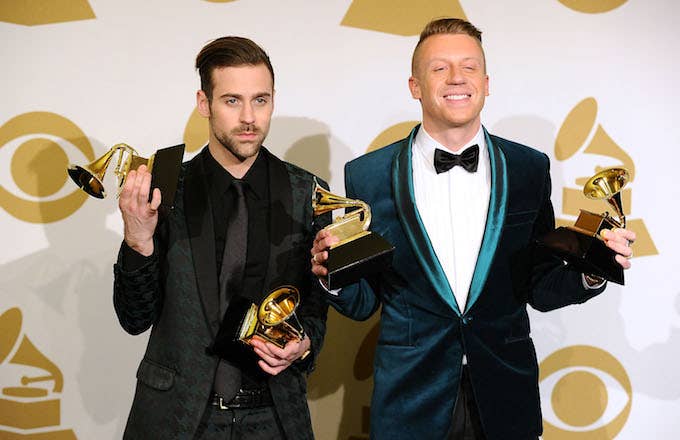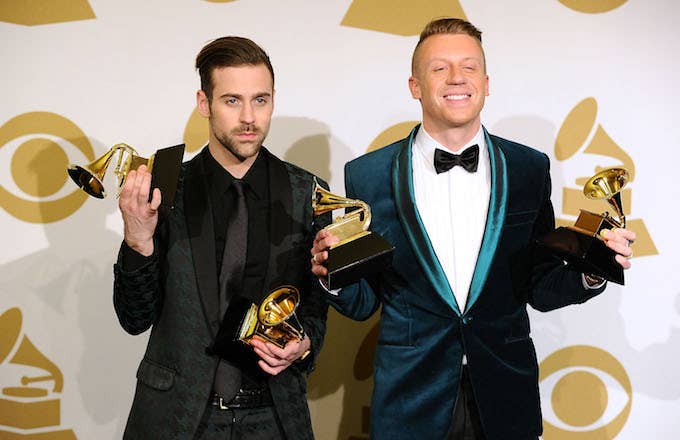
The Grammys have seldom been a friend to The Culture, and it's never been apparent than in 2014. The Recording Academy got caught slipping in a major way when it gave Macklemore and Ryan Lewis three—count 'em, three—out of four rap Grammys. The biggest offense was committed when the duo's kitschy effort The Heist was awarded Best Rap Album over Kendrick Lamar's captivatingly superior good kid, M.A.A.D. city. (It was made worse by Macklemore posting a screenshot of him apologizing to Kendrick for "robbing" him, but that's a story for another day.)
The decision was met with (predictable) industry-wide uproar, with fans, gatekeepers and rappers alike screaming injustice. "Whose mans is this?" we collectively asked. The Grammys have been looked at with a major side-eye since.
You can trace the Recording Academy's missteps, though, all the way back to 1989, the year hip-hop was first introduced as a standalone category with Best Rap Performance award. I'll let Bill Adler, former director of publicity for Def Jam and Rush Artist Management, tell it:
It probably wasn’t until early in the new year that we began to get an idea about how February’s Grammys telecast was shaping up. The producers told us they wanted Will Smith to perform a little rap about the Grammys and then to help present an award in another category. We also learned that the presentation of the rap award would not be part of the broadcast. This was our Kanye moment. We were flabbergasted and angry. How could they salute us in one breath and diss us the next?
Adler wound up organizing a boycott against the Grammys, which included three of its five nominees: DJ Jazzy Jeff and the Fresh Prince, Salt-N-Pepa, and LL Cool J. Other hip-hop artists supported the protest (Slick Rick, Public Enemy) and participated in events that opposed the Grammys, effectively putting up a middle finger to the powers that be.
The relationship between hip-hop culture and the Grammys has been fraught since then, with boycotts cropping up every other year, most recently typified by Frank Ocean's infamous 2017 holdout. "It just doesn't seem to be representing very well for people who come from where I come from, and hold down what I hold down," Ocean told the New York Times, counting R&B and black art in general among the disrespected.
It looks like the Recording Academy may have been listening. An internal reform kick-started last year hinted at the Grammys taking purposeful steps toward the present. By adding streaming-only releases—AKA mixtapes—to its nominations, they threw the door wide open to more participants, allowing Chance the Rapper to score a historic win for Best Rap Album last year.

This year, they've turned the heat up some more by seemingly focusing on the in-crowd of hip-hop and R&B. Internet darlings Lil Uzi Vert, Cardi B, and SZA are all nominated in major categories, and Donald Glover's extremely memeable "Redbone" is up for a couple of awards itself (not to mention his Album of the Year nom for Awaken, My Love!).
And somehow, some way, they've finally managed to put together an extremely solid Best Rap Album category, including literal Culture representatives Migos, who are the antithesis of the typical Academy picks, and fellow anti-establishmentarian Tyler, the Creator. On top of that, Jay-Z—one of the pillars of the game and well-known Grammys critic—will be recognized as an Industry Icon at this year's awards. We've come a long way from him dropping quotes like, "Rappers deserve more attention from the Grammy committee and from the whole world."
But a couple of nominations and acknowledgments don't equal progress. To be frank, it feels like the Grammys are trying to lump a couple decades' worth of progress into a two-year span, after royally fucking up for ages. In February 2016, Hov's little brother and arguably the Grammys' biggest detractor, Mr. Kanye West, tweeted a message for Recording Academy chairman/CEO Neil Portnow: "Neil please reach out as soon as possible so we can make the Grammys culturally relevant again. First order of business. We the people need to see Future at the Grammys. We need to see Young Thug at the Grammys. Not just me and Jay in a suit."
Well, Yeezy. With these recent moves, it seems like the Grammys is getting closer to embracing the artists who actually put on for the culture. The only question is, will the Academy keep going?

